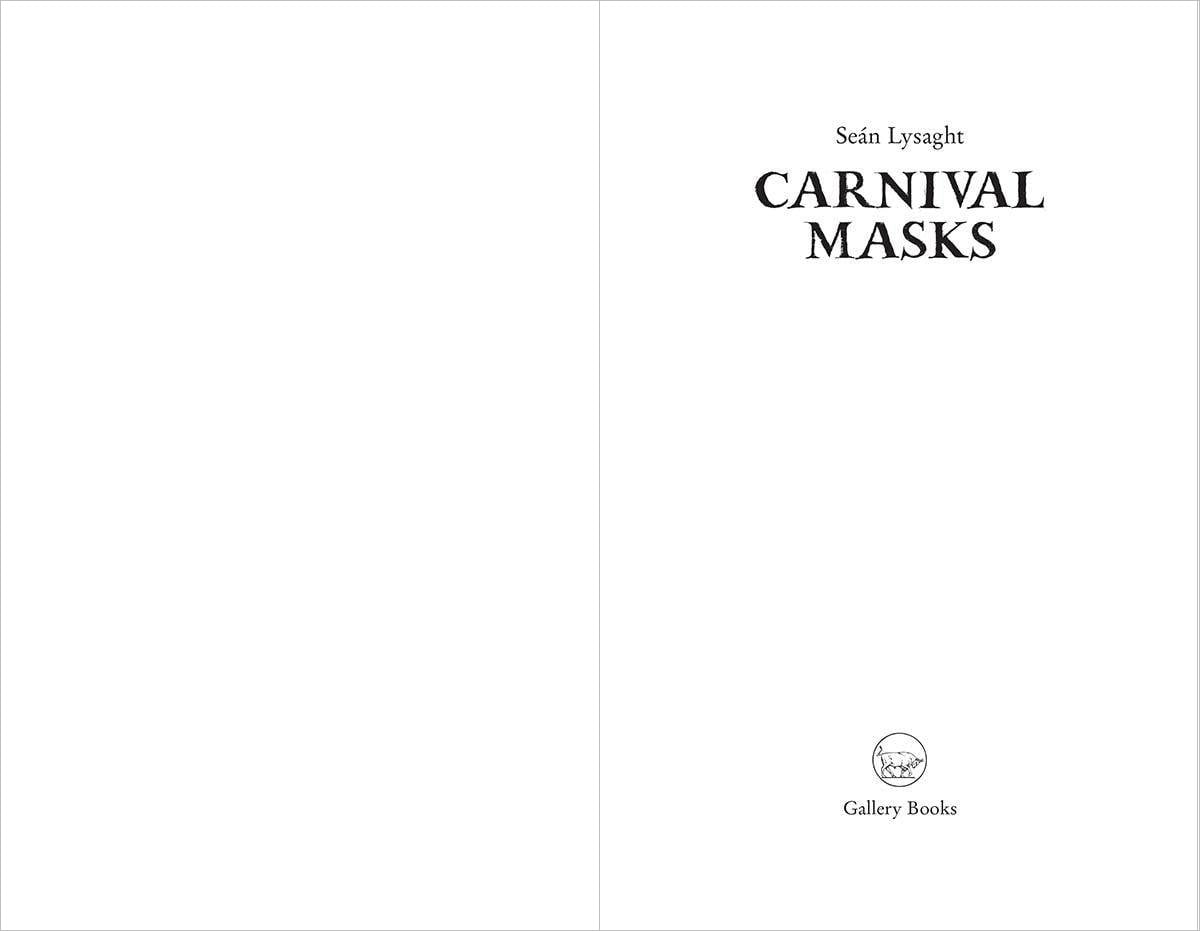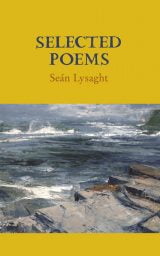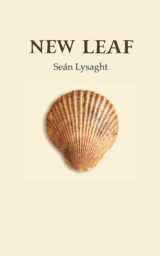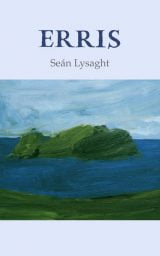Carnival Masks continues on from Seán Lysaght’s The Mouth of a River (2007) and begins in the now familiar place of that book and follows a calendar of reverend attention, its eye and ear in tune to the open spaces of North Mayo. Here, in vivid, signature poems, are skylarks in January, winds in March and April, the arrival of swallows and ‘a squall at the mountain’s heart’ in late August. Here, too, is a run of sonnets engaging with Spenser and a handful of resplendent translations of Goethe and Rilke.
Carnival Masks pivots on a sequence of Venetian epigrams that open into the new light and erotic world of the French Riviera, Tuscan land- and seascapes and an olive grove in autumn. These shimmering poems — and Seán Lysaght’s most opulent book — traverse Europe itself to embrace and report ‘the fabulous, inexhaustible / line of the wide Mediterranean’.
Seán Lysaght’s unquestioned forte is nature poetry . . . he is the best practitioner in that field in Ireland today. — Books Ireland
In his review of Selected Poems (2010) James Harpur celebrated the ‘sensitivity and insight’ of Seán Lysaght’s work, the ‘sense of a pact with nature, of a spell remaining unbroken’.
In Carnival Masks, his superb new collection of poetry, Lysaght forcibly brings home not just his deep sense of time, but also the knowledge that human rhythms and life practices pale when compared to other forms of living life . . .
. . . Though Lysaght writes in an ecopoetical vein, his work if devoid of ideology: in delicately crafted lyrics, he shows much and tells little or, as Falubert has said so eloquently, he is everywhere present but nowhere visible . . .
Lysaght uses technique to great effort: short lines provide even progression and quiet urgency while sonic devices (rhyme, assonance, alliteration) are uti- lized not merely as ornament but as modes of conveying nature’s sounds; in this respect. content and technique are in impressive free play. At no time does the personality and technique of the poet press down hard on the material; through- out, the touch is light though artful and profound.
The second half of the book has chiefly an Italian setting, and includes trans- lations from Rilke and Goethe as well as Lysaght’s own lyrics. Italy, where Lysaght holidays, is attended to in the same manner as Ireland though the landscape draws from the poet an unusual opulence brought on by light and sun and by the sense of the poet as visitor.
Of Irish poets writing today, his work brings us closest to raw nature because his sense of empathy and understanding run so deep, and because his grasp of time is so broad and coherent. Finely detailed, quietly elegant, pushing off into new directions, Carnival Masks is Lysaght’s finest work to date.
— Eamon Wall, New Hibernia Review
Remembering another world in powerfully vivid poems
Seán Lysaght’s new collection, Carnival Masks, begins with Lysaght’s speciality, lyrics that arise from close observations of a particular wild place, in this case the north Mayo landscape with which his readers will be familiar. In these new poems Lysaght presses his scenes from the natural world into service for thematic concerns: the opening poem, Skylarks in January, is exemplary in the way it notices, with typically vigorous precision, how four skylarks call “across the clouds, / still dragging a grey hawser / that ends in the sea / after weeks in the links / while the waves poured thunder”.
What Lysaght does next, though, is rope that image into a very different kind of observation, contrasting those four high-flyers with “all love wants – / there in the heather – is a nest, / a few stray notes, / a closer look at the crest”.
Lysaght reads the natural world and, in poems like this, convinces us that it speaks, indirectly but powerfully, to our concerns.
Such poems can run risks of the kind Oscar Wilde identified when he said of Wordsworth that he “found in stones the sermons he had already hidden there”. When Lysaght marks Queen Elizabeth’s visit to Ireland in 2011, in Whimbrels , he acknowledges how hyperbolic it is to read the “strange notes and wild flutings” of these “curlew cousins with stylish crowns” as a kind of “enchantment”, but he carries on in that vein, ending by declaring the birds “exalt / the actual, like the coming of a queen. / The townland was full of wonderful noises”.
One of the sources of such boldly exaggerated writing may be Lysaght’s study of Edmund Spenser, that archetypal English-language (and Elizabethan) allegorist of Ireland. Lysaght is preoccupied by how we write and rewrite history and, like his contemporary Thomas McCarthy, has previously written a sort of historical verse fiction, in his case a biography of Spenser that he published in 2011.
Carnival Masks includes a sonnet sequence called Letters to a Tudor Poet that reclaims Spenser as he places him in his familiar historical and literary locations: Smerwick Harbour, a pastoral Italian scene, a working farm, the flooding Thames, the “walled town of Corke” and, finally, Kilcolman Castle, his “ruine of time”, where the poet raises “another ghost, / a kestrel from an arch” and hears it “calling / over lonely flats at the Awbeg’s margin”.
The backward look of those Spenser sonnets is also evident in versions of Goethe and Rilke, and in the closing set of poems that happily visit Italy and the Mediterranean, poems that are more occasional and discursive though not without the piercing glances that characterise the book’s Mayo landscapes: “My parents come to Italy now that they are dead, / still the same people travelling in my head, / but more vivid, enhanced, if they appear in a dream / like my mother’s radiant face when I arrive home.” ( Venetian Notebook).
— John McAuliffe, The Irish Times





